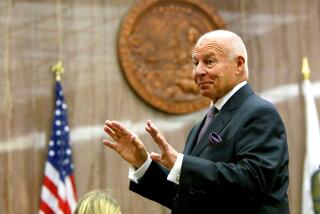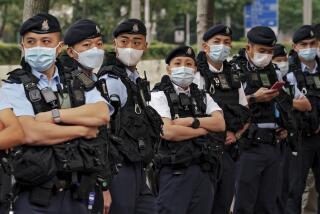Rules seen as setback to justice in China
- Share via
BEIJING — New rules quietly adopted in China are likely to have a chilling effect on lawyers who represent political protesters, Human Rights Watch warns in a report being released in Hong Kong today.
The report, “A Great Danger for Lawyers,” charges that the rule of law in China has been sharply curbed by regulations approved in the spring by the All-China Lawyers Assn., which is in effect the nation’s bar association.
The regulations require that lawyers representing political protesters be “helpful to the government,” share otherwise-confidential information about their clients with prosecutors, and be of “good political” quality, generally a euphemism for dedication to the ruling Communist Party.
The new rules are “restricting access to justice, and access to justice is really a make-or-break issue for China today,” said Nicholas Bequelin, the China researcher for Human Rights Watch. “You’re shutting down the pressure release valve that’s very badly needed in a one-party system.”
Bequelin said the so-called Guiding Opinion on Lawyers Handling Mass Cases was approved by the lawyers association March 20 but was only officially published a month later and was all but ignored by the Chinese press.
He said the rules appeared to be “one element in a multifaceted pushback by the authorities on lawyers and rights activists.”
The rules have also been criticized by Amnesty International and, in the United States, by the Congressional-Executive Commission on China, which monitors human rights in China.
In testimony before the federal commission in September, Jerome A. Cohen, a senior fellow at the Council on Foreign Relations, said the “most sinister provisions require lawyers, after accepting a mass case, promptly to ‘discuss the case fully’ with ‘the relevant judicial departments.’ ” That, he said, referred not just to the courts, “but also to the police.”
Chinese authorities have encouraged the growth of the legal system in recent years, in part to convince international companies that China adheres to international norms and is a safe place to do business.
The government also has tolerated an increase in dissent while the country goes through an unprecedented and sometimes jarring period of change. It has made it clear in recent months, however, that there are limits to that tolerance.
Several recent cases have involved the prosecution of lawyers or activists, including a court’s decision this month to uphold a four-year prison term for Chen Guangcheng, a self-trained “barefoot lawyer” who had been an advocate for villagers who objected to China’s one-child policy. He was charged with destroying public property and “organizing a mob to disturb traffic.”
In another sign of a new, harder line, the official New China News Agency published an editorial Friday that called mass protests “the most outstanding problem that seriously impacts social stability.” It called for the “prudent” use of force in handling such incidents.
The All-China Lawyers Assn. said Friday that it had not seen the Human Rights Watch report and would have no comment on the Guiding Opinion. Human Rights Watch did quote the head of the lawyers association, Yu Ning, as saying the rules were designed to improve “the ability of lawyers to resolve contradictions between citizens and the government,” and to “offer better protection for the security and interests of lawyers, so as to avoid conflicts with the government.”
As described by Human Rights Watch, the Guiding Opinion makes it clear that lawyers’ first responsibility is to society, not their clients. “During these important times,” the rules say, “correct handling of cases of a mass nature is essential to the successful construction of a socialist harmonious society.”
“These regulations,” Bequelin said, “spell out rules that are simply incompatible with carrying out your professional duties as a lawyer.” He said they negated “the principle that is consecrated even in Chinese law, that the lawyer’s duty is to his client.”
The rules also warn lawyers not to “stir up the news,” and to take special care with international media.
Since the guidelines were published, Human Rights Watch said, several local governments in China have adopted more stringent rules about lawyers in protest cases, and one province has banned them from speaking with reporters.
Bequelin said that was especially worrisome, because national and international exposure is sometimes necessary to persuade local officials to take protesters’ claims seriously.
Human Rights Watch said the new restrictions would discourage lawyers from wanting to take on political protesters as clients, in effect depriving dissidents of “meaningful legal representation.”
The result, the report warns, may be to instill “a sense of futility about legal avenues of redress that may exacerbate social unrest in the future. This is a significant development for the fate of legal reforms in China.”
mitchell.landsberg@latimes.com
More to Read
Sign up for Essential California
The most important California stories and recommendations in your inbox every morning.
You may occasionally receive promotional content from the Los Angeles Times.










